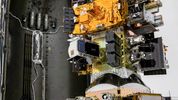When Blue Origin’s NS-21 flight launched with an all-female crew, featuring high-profile names like Katy Perry, Gayle King, and Amanda Nguyen, the media attention was immediate. From a visibility standpoint, it was a moment. But as someone working in SpaceTech investment, I couldn’t help but feel conflicted. Yes, it was a milestone for representation. But it also reinforced a growing misconception: that space is primarily a playground for celebrities and billionaires.
The crew, while accomplished, were primarily high-profile and high-net-worth individuals. For many, this was less about progress and more about PR. Another billionaire-backed space tourism mission that reinforces the idea that space is a luxury reserved for the rich and famous.
Space tourism is a small, highly visible sliver of a much bigger, much more meaningful industry. SpaceTech today is not just about launching people, it’s about protecting life on Earth.
From satellites tracking wildfires and foods, to systems enabling secure communications in conflict zones, to constellations improving climate models and crop forecasting, SpaceTech is our planet’s health monitor. It supports global security, drives connectivity in underserved regions, and powers breakthroughs in sustainability.
The problem is, space tourism gets the spotlight, while the companies building the infrastructure that actually serves humanity remain largely misunderstood by the general population.
That's why this latest launch feels so complicated.
Yes, it showcased women in space, and that matters. Yes, it sparked conversations about representation, femininity, and identity in an industry that often excludes all three. But when the primary focus is celebrity, style, and spectacle, we risk distorting public perception of what space is for.
We need to shift the narrative.
I want to see missions where scientists, engineers, and operators, especially women and underrepresented voices are given the same platform as public figures. People like Dr. Swati Mohan, who guided the Perseverance rover to Mars, or Christina Koch, who holds the record for the longest single spaceflight by a woman.
Of course, public figures can help drive interest, and that’s valuable. But we need to strike a balance. Let's use visibility not just for virality, but to showcase the life-changing, planet-saving power of space technologies.
So yes, the NS-21 launch was a milestone in some ways. But it also highlights a bigger challenge: making sure space is not seen as a playground for billionaires, but as a platform for progress.
Because space isn’t about who gets to ride the rocket. It’s about who benefits from what we build. And that should be everyone.
 unknownx500
unknownx500











